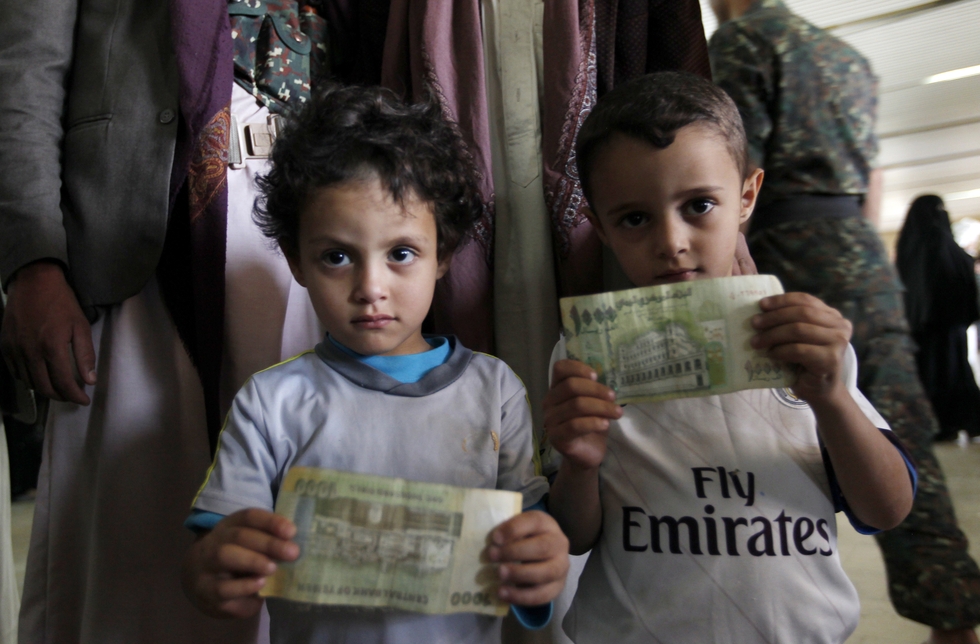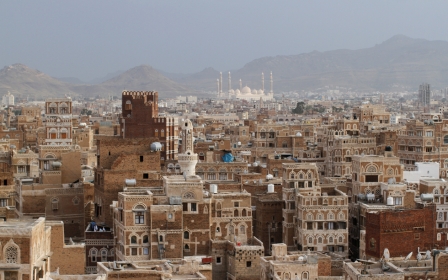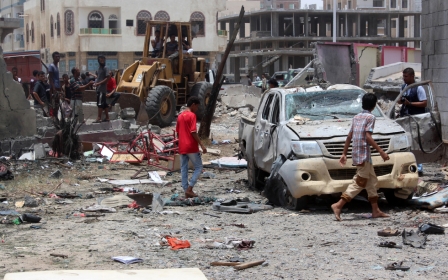Feud over Yemen central bank deepens economic woes

TAIZ, Yemen - Adel Mansour, a public school teacher in Taiz province, has endured the war and managed to care for his family with few resources.
But his life has taken a dramatic turn for the worst this month, as the government failed to pay his monthly salary at the end of September.
Mansour buys what he needs from shopowners on credit. By the end of each month, he pays them back, but last month he could not, so store owners declined to sell him more goods.
“I only have a bag of wheat in my house,” he told Middle East Eye. “I do not have enough groceries. I could not even buy notebooks and backpacks for my four children to study … The government did not pay our salaries for the last month.”
Mansour earns 64,000 Yemeni Rials ($256) per month. He said the salary is hardly enough for his family. His rent alone is YR25000 ($100).
New MEE newsletter: Jerusalem Dispatch
Sign up to get the latest insights and analysis on Israel-Palestine, alongside Turkey Unpacked and other MEE newsletters
“Vendors have refused to sell me on credit, and the landlord is threatening to evacuate me from his house if I do not pay rent in the next 10 days,” Mansour continued. “The wheat I have may last for one month, but I don’t have anywhere else to live. I don’t want to move my family to a refugee camp.”
Houthi rebels took over the capital Sanaa two years ago, but they paid salaries of public employees in all the provinces, even areas under control of pro-government forces.
However, on 18 September, President Abd Rabbu Mansour Hadi moved the central bank from Sanaa to Aden, accusing the Houthis of using foreign currency reserves for their own interest.
After the move, Prime Minister Ahmed Obaid Bin Dagher pledged that the government would pay the wages of public employees across the country.
But until now, public sector workers have gone unpaid.
Mansour, like more than one million other public employees, is waiting for the government or the Houthis to pay their salaries.
"There are two central banks in Yemen, and I do not know which one is responsible for our pay,” Mansour said. “We cannot do anything. We are just waiting."
Last month, Houthis started asking Yemenis for donations to the Sanaa-based central bank, a request that Mansour finds shocking.
Houthi officials are soliciting donations in the markets and streets of the northern provinces. They are encouraging people to make contributions, even if they are as small as YR50 (20 cents). They also created a system where people can donate via text messages from their mobile phones.
Last month, the government-controlled provinces sent their revenues from taxes and fees to the central bank in Aden, while areas under Houthi control sent the money to Sanaa. Hence, both banks are still working.
“Even if the Houthis manage to raise the money for our pay this month, they will not be able to pay us next month,” Mansour said. “We want a permanent solution to our wages.”
The feud over the central bank has raised fears of shortages in food supplies, which have put the war-torn country on the brink of famine.
"The politicisation of the central bank and attempts by the parties in the conflict to use it as a tool to hurt one another ... threaten to push the poorest over the edge," Richard Stanforth, humanitarian policy advisor with Oxfam, told Reuters earlier this month.
'Economic warfare'
The Houthis and their supporters consider the donations to the central bank to be part of the war against Saudi aggression.
The conflict erupted last year after Houthi rebels took the capital, Sanaa. A Saudi-led coalition then began a bombing campaign to stop the Houthis, who are allied with former President Ali Abdullah Saleh and whom Riyadh accuses of being backed by Iran.
Last month, the leader of the Houthis, Abdul Malik al-Houthi, asked Yemenis to support the central bank, which sparked a social media campaign of sarcasm and anger against the rebels.
Abu Gibril, a Houthi leader in Taiz's al-Hawban area, said that donating to the central bank is a national duty.
“All Yemenis have to participate in the war against Saudi Arabia, which is killing civilians,” he told MEE. “Those who cannot fight can donate to the central bank.”
Abu Gibril is responsible for collecting donations from the al-Hawban area and depositing them into the central bank. He urged patience from Yemenis who are suffering.
"Saudi Arabia and its mercenaries could not win on the battlefield, so they are trying to use economic warfare,” Abu Gibril added. “I want to tell them that they will lose there, too. Some Yemenis laughed at the idea of donations to the central bank, but many traders have donated. Millions went to the central bank from al-Hawban alone."
Al-Masirah TV, a pro-Houthi channel, said donations to the central bank have reached YR1 billion.
However, Mohammed Gomaih, a political analyst, described the campaign for donations as a form of “robbery”.
“The lies of al-Masirah channel about the donations will be exposed when employees demand their wages,” he said. “The Houthis, however, can say that President Hadi is responsible for the salaries because they rejected relocating the central bank to Aden."
He called on the Houthis to secure enough food for residents before they ask them to fight or donate, accusing the rebels of embezzling money from the central bank to advance their cause.
Public employees, who have yet to be paid, did not go on strike or hold notable public demonstrations.
‘Government will pay salaries’
Yemeni PM Bin Dagher renewed his pledge last week that the government will pay the wages of civil and military public employees in the entire country.
An official in the central bank in Aden said the government-controlled bank will cover the salaries of all public workers who were employed before September 2014 because the rebels hired many people illegally after they took over Sanaa.
"The delay in paying is because of difficulties in getting the data of the employees, but I can confirm that the central bank will pay the wages during the coming week," the official told MEE on the condition of anonymity because he is not authorised to speak to media.
He added that there is a plan in place to address the lack of Yemeni currency, saying that countries in the Saudi-led coalition will support the Aden-based central bank.
Yemeni economic expert Ahmed Saeed said there is no excuse to the hold-up of wages, especially that President Hadi relocated the central bank to be responsible for paying public employees.
"When the central bank was in Sanaa, the Houthis always paid employees on time,” he told MEE. “The Yemeni government has to fulfil that duty now. The government wants to fight the Houthis economically, but the main victim of any economic war is always civilians.”
He said the money that the Houthis are raising from donations will not be enough to pay salaries or provide people with basic services like electricity and water.
As the war continues, average Yemeni citizens remain concerned with their livelihoods.
“I do not care who will win the war,” Mansour, the teacher, said. “I am only looking for a government that can pay my salary, so I can feed my children and buy their school supplies."
Middle East Eye delivers independent and unrivalled coverage and analysis of the Middle East, North Africa and beyond. To learn more about republishing this content and the associated fees, please fill out this form. More about MEE can be found here.




